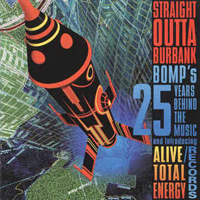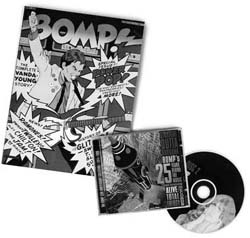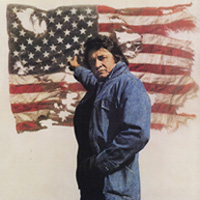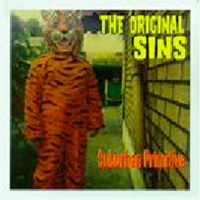 Bomp! Records
Bomp! Records
A Success Everywhere But On the Billboard Charts
An interview with Greg Shaw
by Jon Sarre
Hopefully this won’t get buried in all the millennial hoopla, but as the rest of the world participated in a frenzy of will-the-world-end-what-will-I-wear? idiocy, the longest continuously running independent label, Bomp! Records, of Burbank, CA, marked its twenty-fifth year of being one of the few diamonds in the cesspool of the music business. If it had been Capitol or Seagrams or whatever the hell that’s called nowadays, the occasion’d be marked with an all-star network TV special or Smithsonian Institution Lifetime Achievement Award (hell, Bomp! may be the only record company that oughtta receive a hefty NEA endowment for its services to the fucking industry), but much like it’s been since 1974, it’s been left up to label honcho Greg Shaw to mark the occasion on his own by releasing a neato two disc compilation called Straight Outta Burbank. Not only does this collection chronicle a whole mess of bands who’ve shown up on Bomp! product over the years (it’s got the Dead Boys, Iggy, the Heartbreakers, the Germs, the Dils, Zeros, Weirdos, Flesheaters, the Lazy Cowgirls, the Brian Jonestown Massacre, Jeff Dahl, and that doesn’t include legends and semi-legends who don’t have stuff on the comp like the Flamin’ Groovies, Stiv Bators, DMZ, the Dwarves, and Jonathan Richman and the Modern Lovers) but it also introduces newish Bomp/Voxx associate/partner in crime Patrick Boissel and his Alive/Total Energy label (which has been busy over the last couple years putting out lotsa stuff from people like the MC5, the Deviants, the Pink Fairies, Nikki Sudden’s Swell Maps, US Bombs, the StreetWalkin’ Cheetahs, Tav Falco, and Davie Allan). An overload of Bompitude, it is, heavy on the hitters if short on the hits. The whys and hows of that are best left to Mr. Greg Shaw himself.
To start off, congratulations on twenty-five years in the business.
Thank you.
It’s pretty incredible, do you know of any legitimately independent labels that’ve been around as long as Bomp!?
We’re the first, so nobody could possibly be around longer, but some of them have been around fifteen years or more. I don’t think any of the labels that started in the ’70s are still around.
Well, SST…
SST’s not still a label is it?
 They don’t put out anything good… That’s something I wanted to talk about further down the line, but since we’re sorta on the subject; what’s the secret to putting out aesthetically good releases when a lot of labels sorta lose their focus, SST being a good example… the back catalogue keeps ’em in business, or look at Homestead, they had a good run there for a couple of years in the mid-’80s and then just fizzled out.
They don’t put out anything good… That’s something I wanted to talk about further down the line, but since we’re sorta on the subject; what’s the secret to putting out aesthetically good releases when a lot of labels sorta lose their focus, SST being a good example… the back catalogue keeps ’em in business, or look at Homestead, they had a good run there for a couple of years in the mid-’80s and then just fizzled out.
Homestead was an off-shoot of a distributor [Dutch East India], and the only vision was due to Gerard Cosloy. When he left to start something else [Matador Records], the creative vision went with him. With SST, I think Greg [Ginn]’s tastes changed over time. Everyone’s tastes change, my tastes change, but I guess my taste is just more consistent… I don’t make the same kind of records I made ten or twenty years ago, but I stayed in a certain tradition, so people know they can expect something with the label. That may be part of the secret, but I think that’s small. The larger part of surviving is making money and getting paid and controlling your impulses and not spending too much on a band you’re really excited about… And another part is not expecting to make much money… A lot of people can’t live that way.
Back in 1974, when you put out that first Flamin’ Groovies record, did you think you’d still be doing this twenty-five years later?
I never thought about the future. I didn’t even want to be in the record business, I thought I didn’t know anything about it. I thought I’d always be a writer or publisher or something like that, [but] as I got into it, I found that the record business offered more opportunities for emphasizing my creativity and for my involvement in things that were happening, where as being a writer you’re always responding to things that are happening. It’s more exciting to be doing it, so I caught the bug. What I thought would happen was it would lead to something else, maybe I would end up at a major label with some kind of money. I mean, for the first five years, we were just on the verge of having a big hit record and then we would get distribution from a big major label, and then it would be a different kind of story… I thought I’d be like Seymour Stein, he had Sire and distribution through Warner Bros. and got to sign all the cool bands and make millions of dollars. I thought that was gonna happen to me. He was my only role model. It turned out it’s impossible to have a hit record on an independent label. The majors only fuck you over. It seemed like it was once possible back in the ’60s to have at least a regional hit on an independent label, look at the Kingsmen or ? and the Mysterians…
Sure, all that Nuggets stuff. It was on the radio cuz the radio used to play those records. I hope this isn’t a naive question, but why was it possible to have a hit with an independent record and what’s changed so it’s not now?
It’s not impossible; Epitaph did it.
Is Epitaph truly an independent label?
Yes.
I thought they had major label distribution behind them.
They’ve had their chances, but Brett [Gurewitz] always turned it down. That’s why it’s really remarkable – they had the first hit on an independent rock’n’roll label in like twenty years. It takes a lot of money to get a record on the radio… it costs a fortune. In the ’60s, if you put out a cool record, the DJs would play it. You can’t do that now, you have to spend like a quarter million dollars to get a record on the charts. If you have that kind of money, it could theoretically be done.
So how is that different from when Alan Freed got busted for the whole payola scandal?
I’m not sure that’s what he got busted for. That was the cover. What he got busted for was not having the right political connections cuz Dick Clark and everyone else were doing the same thing. Payola goes on at the major labels and that’s how you get on the charts.
So who do you pay off to get on the charts?
I don’t really know… I don’t even know what those charts mean. I don’t even know who those artists are…
You did the notes for Rhino’s Nuggets box set… Were you one of the first people to pick up on that when it came out originally in, was it ’72, or ’74?
’73.
 You were doing Bomp! Magazine…
You were doing Bomp! Magazine…
Back as far as 1970, nobody knew about any of that music, except for the records that had been hits in their own hometown. I knew about the Chocolate Watch Band and the Golliwogs and a couple other bands that came out of San Francisco. I didn’t know that there were bands like that in other cities. I sort of knew about the Sonics, cuz they played in San Francisco. I had no idea that there was this national scene involving tens of thousands of bands. There were a few record collectors who began collecting this stuff, and a network began of those of us who started writing to each other and started learning about this stuff… After a while, a picture started taking shape of a whole unknown music scene. I felt like an archeologist… That’s where the idea for the Pebbles albums came from, my idea that this music needed to be heard. I mean, my generation of rock critics were all writing about the Rolling Stones and Bob Dylan and the Beatles and their idea of the high water mark of rock’n’roll, and I started saying, “No, you guys, ‘Dirty Water’ was a better record than anything on Blood on the Tracks“. It was a very politically incorrect thing to say.
It [“Dirty Water”] is a 2:30 pop song.
I think we won that battle… I think people now are saying, “Yeah, the Beatles were important, but this garage stuff has had an ongoing influence.” Nobody’s influenced by the Beatles anymore… That was the mission for me throughout the ’70s and ’80s. I thought lots of people who were influenced by punk needed to be reminded of what came before.
It seems like you were close to having a hit single out a couple times, and then major labels came in, Elektra, in a couple cases…
Yeah… the guy was a total schmuck. He went out and tried to steal all my artists. As soon as I had a little bit of success, he’d come in, make an offer, take them away and kill their careers. Real schmuck!
How does that work? Your contract...
I don’t have long term contracts with these people. It’s always a one-off. They [the majors] come in and give the artists a million dollars to make three records.
So they sign…
So they say to me, “Well, since you got this record out, we’ll give you points on it, we’ll take it away, we’ll make it a real hit and you’ll get two points, plus we’ll pay back the money,” which is like a thousand dollars… Then I pray that they get it on the charts and of course they don’t, like with the Plimsouls’ “A Million Miles Away.” We had that on like 300 radio stations around the country, it was bubbling under the Billboard charts, it was going to be a legitimate hit if we kept working it. They [Geffen, in this case] took it away and didn’t issue it for like a year and a half, at which point they put it out again and by then, it’s an oldie. Just typical of how these idiots work. It happened around that period [’81, ’82] two or three times, and it really soured me on working with them.
That would do it. They don’t sound like enjoyable people to deal with. But speaking of enjoyable people to deal with, I wanna ask you a bit about Iggy… James Williamson comes in with a box of tapes…
That’s pretty much it, he was turned down everywhere else.
Was that like Christmas to you, or what?
Kind of, but at the time, it’s 1977, I was signing punk bands, so everyday, people like REM are coming in… bands that I knew would be major contenders, and I had to say no to most of ’em. I could’ve had Devo… If any label had said to me, “Here’s $25,000, go out and develop the bands you’ve got,” I could’ve signed ten bands that went on to have huge hits, but I never had the chance, so they slipped through my fingers. That was a time when there were lots of great bands around… So it wasn’t a surprise to me when a guy like Williamson walks in who can’t get a deal for Iggy cuz he’s on drugs so nobody wants to sign him… It was an opportunity to work with someone very important to me [on what would become Kill City]… I love the Stooges, it was more important to me than a band like Devo, who I had no emotional connection with. In retrospect, it was Christmas, cuz we were still making money…
You’re still putting out those records [the Iguana Chronicles]. Have you ever met Iggy?
Not since I started “working” with him. I’d met him a few times in the ’70s when he was kind of messed up… Iggy’s always been cooperative… We send him some money.
But he doesn’t send you tapes when he’s cleaning out his garage?
No, I find ’em on my own…
Is there anyone, past or present, who you would’ve liked to put something out by? Or any record you could’ve done in the past that you couldn’t do?
The Pretenders… I would’ve loved to have the Cramps… IRS got a lot of bands I could’ve had.
You guys are still around and they’re not…
It was over for those guys a long time ago. They’d have as much relevance today as Slash Records; why are they still around?
To re-release The Decline of Western Civilization soundtrack every once in a while.
[laughter] Yeah.
What’s your favorite Bomp! release?
I don’t think I can answer that; I like ’em all.
Do you have one that you think, “Why’d I put that record out?”
Oh, yeah, a few of those, but…
You don’t wanna name names?
No… my memory’s not that good. There’s always a record you do for political reasons cuz you wanna get Artist A, but you gotta put out their best friend, Artist B, too…
Do you have a game plan for the next thousand years, or are you gonna just keep on keepin’ on?
I only know one way to do things, just wait until something comes along that I like… That’s how it works.
(Box 7112 Burbank, CA 91510)



